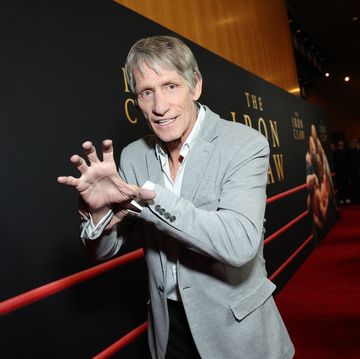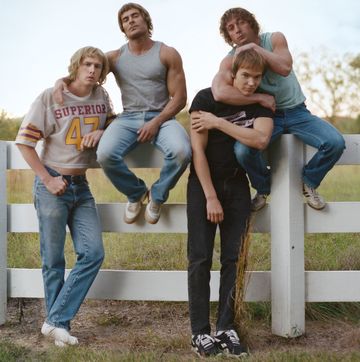Editor’s note: This article includes spoilers about events related to Apple Cider Vinegar.
Belle Gibson offered hope to cancer patients and their families around the world with her inspiring story of overcoming the disease through healthy eating and at-home remedies.
If her story seems too good to be true, that’s because it was.
Gibson’s rise as a health influencer and her shocking downfall inspired of the new Netflix series Apple Cider Vinegar, which debuted on Thursday. The dramatized account stars Kaitlyn Dever as a fictionalized version of Gibson, the young mother who later admitted her terminal brain cancer diagnosis was completely false.
Based on the 2017 investigative book The Woman Who Fooled the World, the limited series is set to explore the lure of online fame and its consequences. Here’s how Gibson’s cancer scam was exposed, what has happened in her life since, and what might have driven her to, intentionally or otherwise, deceive thousands of supporters.
Belle Gibson presented herself as an online wellness influencer
In 2009, Gibson became a single mother to her son, Oliver. She then rose to social media and internet fame as a wellness influencer in the early 2010s after claiming she overcame terminal brain cancer through healthy eating and natural remedies instead of chemotherapy and radiopathy. She also claimed she underwent multiple heart surgeries, suffered a stroke, and that her cancer had spread to her blood, spleen, uterus, and liver in July 2014. A leading Melbourne neurosurgeon later told The Sydney Morning Herald such spreading of a malignant brain tumor was extremely unlikely.
In addition to blogging about her own health journey, became a single mother a popular Instagram account that drew more than 300,000 followers. In 2014, she launched the The Whole Pantry app, promoting her alternative treatment methods, and authored a cookbook of the same name. While seemingly offering cancer patients and their families a renewed sense of hope, Gibson also promised to use her platform to donate large amounts of money to charitable causes.
Except it was all a lie: Gibson never had cancer to begin with. As more people in Gibson’s circle began to sense the falsity of her claims, a pair of investigative journalists started to chip away at the truth.
Reporters probed Gibson’s donation history
In 2015, Melbourne-based newspaper reporters Nick Toscano and Beau Donelly received a tip from their editor that one of Gibson’s friends, Chanelle McAuliffe, believed the influencer had faked her cancer diagnosis. On Donelly’s first call with McAuliffe, which lasted about an hour, she claimed Gibson had faked a seizure at her son’s 4th birthday party and that she and other friends had attempted an intervention, hoping Gibson would share her medical records.
“I started that call feeling very critical, almost dismissive, of Chanelle’s claims, but I came away from it absolutely fascinated by what she was saying,” Donelly told Australia’s The Morning Edition podcast. “So, the first thing I did was I went to Instagram, and I looked Belle Gibson up. I looked at what she’d been saying, and I very quickly noticed that everything, including her health claims, were either really vague or totally inconsistent or just seemingly implausible.”
Because none of Gibson’s friends spoke on the record, Toscano and Donelly instead focused their initial research on Gibson’s public claims that she donated large amounts of money to charitable organizations. Many groups denied receiving payment. When the pair contacted Gibson directly to ask about the donations and parts of her medical history, she blamed the money discrepancies as a “cash flow problem.”
Gibson denied the contents of the story published in March 2015, but more people began to question her claims. As Toscano and Donelly continued to investigate, her story quickly unraveled.
Gibson then told a magazine her diagnosis was fake
Only a month later in April, then-23-year-old Gibson agreed to an interview with The Australian Women’s Weekly and admitted she never had cancer of any kind. “None of it’s true,” Gibson told the magazine. “I don’t want forgiveness... I just think [speaking out] was the responsible thing to do. Above anything, I would like people to say, ‘Okay, she’s human. She’s obviously had a big life. She’s respectfully come to the table and said what she’s needed to say, and now it’s time for her to grow and heal.’”
Still, Gibson denied lying about about her diagnosis, instead claiming two men—unnamed in the interview—told her she had cancer. “I think my life has just got so many complexities around it and within it, that it’s just easier to assume [I’m lying],” she said.
Gibson maintained there was no malicious intent to her actions during a TV interview with 60 Minutes Australia later that summer. She also claimed she was preparing to tell the truth within 10 days of news outlets questioning her story. “Once I started to figure out where I stood and what reality actually was and I received the definitive ‘No you do not have cancer,’ then that was something that I had to come to terms with. That takes a lot,” she told reporter Tara Brown. “I was feeling a huge amount of grief... that I had been lied to and that I felt like I had been taken for a ride. It took me a lot to unpack that.”
She still hasn’t paid the fine for her deceit
Reaction to Gibson’s revelation was swift. In March 2015, Apple removed The Whole Pantry from its app stores in Australia and the United States. Similarly, Penguin Publishing pulled Gibson’s cookbook from circulation in Australia and canceled its launches in the United States and the United Kingdom. The company also paid a fine of $30,000 for failing to fact-check the book.
Gibson was never criminally charged for her scheme. However, the government agency Consumer Affairs Victoria brought a case against her to Melbourne federal court in 2016. The following year, the court found that Gibson had violated Australian consumer law preventing trade or commerce likely to mislead or deceive, according to The Guardian. In September 2017, a federal court judge ordered Gibson to pay $410,000 to the state of Victoria as well as a percentage of its legal costs.
The disgraced influencer didn’t show up for any of her hearings in the case and later claimed in court in June 2019 that she couldn’t afford to pay her large fine. Forensic accountants found that Gibson had spent $91,000 over the prior two years on betting, cryptocurrency investments, as well as clothes and accessories. Her then-partner, Clive Rothwell, paid most of her bills.
Gibson still seemingly hasn’t paid any of her exorbitant penalty. In February 2024, a reporter for the Channel 9 news program A Current Affair approached Gibson at a gas station near Melbourne, where she offered her first public comments since the 60 Minutes interview. “Have some humanity. I haven’t paid things because I can’t afford to,” she said.
Reporters make the case Gibson might have Münchausen syndrome
Toscano and Donelly conducted additional research and interviews about Gibson’s history, including with her estranged mother and stepfather, and used their findings to publish The Woman Who Fooled the World in 2017. The journalists hypothesize Gibson might suffer from a form of Münchausen syndrome, a psychological condition officially called factitious disorder in which someone feigns illness or symptoms to garner attention. A similar case currently also in the spotlight is that of Amanda Riley, the American mother who used a fake terminal cancer diagnosis to raise money from unsuspecting donors.
Specifically, Toscano and Donelly suggest Gibson might have a specialized form called Münchausen by internet, which causes people to “identify as a patient, a fighter, or as survivor, and they crave attention, sympathy, and control” from their digital audience. They also found that Gibson had a history of lying about her health from a young age and believe her troubled childhood could have played a role in her actions. Though, that doesn’t make them any less devious.
“By the time Belle Gibson started the app, she was a young broke mum, a young broke single mum living in the city. She was definitely vulnerable,” Donelly said. “That said, a lot of people are vulnerable or have had difficult childhoods, and they don’t go on to become a cancer scammer.”
Watch Apple Cider Vinegar now
While the events of Apple Cider Vinegar are largely fictional, actor Kaitlyn Dever wanted to ensure her portrayal was as close to the real Gibson as possible. The Arizona native, who stars in the second season of the HBO drama The Last of Us later this year, worked with accent coach Jenny Kent to perfect the intonation and inflection of the Australian’s voice.
“Jenny and I were seeing each other three times a week over Zoom and going over every single word that I say, kind of like I would a song, memorizing those sounds,” 28-year-old Dever told Netflix’s Tudum. “I love accent work in general, but there’s something about this accent in particular and how it allowed me to dive deep into someone else. It was really helpful for me to separate myself from the character.”
You can see Dever’s turn as infamous scammer Gibson in Apple Cider Vinegar. All six episodes are now streaming on Netflix. The series also stars Milla Blake, Alycia Debnam-Carey, and Aisha Dee.
Tyler Piccotti joined the Biography.com staff as an Associate News Editor and is now the News and Culture Editor. He previously worked as a reporter and copy editor for a daily newspaper recognized by the Associated Press Sports Editors. In his current role, he shares the true stories behind your favorite movies and TV shows and profiles rising musicians, actors, and athletes. When he's not working, you can find him at the nearest amusement park or movie theater and cheering on his favorite teams.














